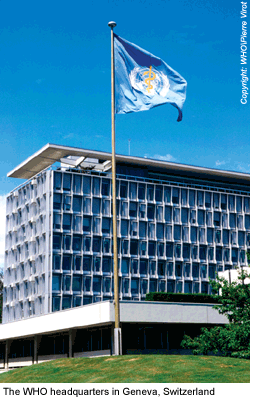
A World Health Organization review panel has concluded that, under conditions similar to those found in Denmark, the use of antimicrobials for the sole purpose of growth promotion in livestock can be discontinued without major consequences. The review panel based its conclusion on Denmark's experience. Denmark stopped using these drugs as growth promotants in 1999, and the WHO review panel has concluded that the country did not suffer any serious negative effects because of the ban. Passions are high on both sides of the issue. Some point out that the drugs are approved by the Food and Drug Administration as safe and effective drugs, as well as by regulatory agencies in many other countries, and have a decades-long track record of safety and efficacy. The Coalition for Animal Health released a statement saying that the WHO review panel based its conclusion on presumptions—that benefits will accrue because consumer confidence in meat products will increase and that human health benefits from a ban are "likely." The coalition, which includes, among others, the AVMA, AABP, Animal Health Institute, National Pork Board, and National Chicken Council, says the WHO review panel position mirrors the political, not scientific, action taken by the European Union. Others are thrilled. "WHO's new report makes it clear that routinely feeding antibiotics to farm animals is unnecessary and a dumb thing to do. The experts have taken a hard look," said David Wallinga, MD, a senior scientist at the Institute for Agriculture and Trade Policy. The IATP promotes family farms, rural communities, and ecosystems. The Coalition for Animal Health says, however, that the European Union's ban has had some negative consequences. A paper in the August issue of the Journal of Antimicrobial Chemotherapy reviews published literature as evidence and concludes that the removal of growth-promoting antimicrobials in Europe has significantly increased animal disease and the use in animals of antimicrobials that are important in human medicine. In addition, the ban has not significantly affected the prevalence of resistant enterococcal infection in humans. These negative consequences, however, don't seem to be swaying the European Union's stance. In July, the EU adopted a final regulation that completes its ban on antimicrobials as growth promoters, phasing out the four remaining ones: monensin sodium, salinomycin sodium, avilamycin, and flavophospholipol. These drugs are not used in human medicine and do not have analogues used in human medicine. The Coalition for Animal Health says U.S. producers exercise great care to protect public health when they administer antimicrobials and this can be seen in the statistics. According to the national Centers for Disease Control and Prevention, the incidence of resistant foodborne bacteria and rate of foodborne illness are dropping in the United States. The incidence of bacterial pathogens on raw meat and poultry is also dropping, according to the Department of Agriculture. The WHO review panel joins a list of others who have recently argued for further limiting antimicrobial use. In June, Sen. Edward M. Kennedy (D-MA) and Rep. Sherrod Brown (D-OH) introduced bills that would ban, in two years, the use of antimicrobials used in human medicine for nontherapeutic purposes in food animals, including routine uses to prevent diseases in livestock and other common uses. Also in June, McDonald's Corporation called for its suppliers worldwide to phase out animal growth-promoting antimicrobials that are also used in human medicine. The AVMA opposes the currently proposed congressional bills, because they recommend banning drugs by categories of classes of use instead of through risk-based, individual drug-use-species combination decisions, such as the decision process used by the FDA. The AVMA, however, does see some positive elements in the bills. "There are parts of the Kennedy bill that the AVMA could possibly support," said Dr. Lyle P. Vogel, director of the AVMA Scientific Activities Division. "Those sections include assistance to defray the expenses of producers who phase out growth-promotant uses, grants for research and demonstration programs, and collection of data on quantity of antimicrobials used, provided that the data are supported by sufficient contextual information." The AVMA has developed an analysis and commentary on the bills and has shared the document with congressional offices and other organizations. Only time will tell what role the WHO review panel's stance will play in influencing Congress. Dr. Vogel points out that conditions in the United States are different from conditions in Denmark. In addition, while the WHO review panel report states there were no "serious" negative effects in the Danish experiment, that depends on what you consider serious. It clearly had a negative effect on animal health and, so far, no positive impact on human health. The bottom line, however, may be whether the WHO review panel report has a solid scientific foundation. "The one thing that differentiates us here in the U.S. from Europe is that we do try to base these public policy decisions on science and risk assessment," said Ron Phillips, spokesman for the Animal Health Institute. "Of all the publications cited in the WHO report, there are only two peer-reviewed articles. The WHO report is not science."
|